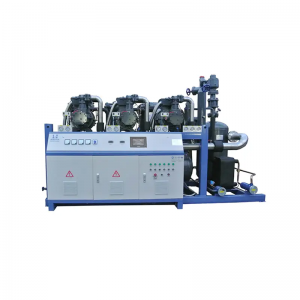The refrigeration industry continues to evolve and push the boundaries of cooling technology. One of the key developments in this field is the continued advancement of refrigeration compressor systems. Consisting of basic components such as refrigeration compressors, condensers, coolers and solenoid valves, as well as auxiliary components such as oil separators, liquid reservoirs, sight glasses, diaphragm hand valves and return air filters, these systems are expected to revolutionize the cooling system industry .
The heart of any refrigeration compressor system is the refrigeration compressor itself. This key component works by compressing and circulating refrigerant, thereby facilitating the removal and transfer of heat in the system. Using various mechanisms such as motor driven piston, scroll or rotation, these compressors play a key role in efficient cooling operations.
The condenser and compressor work together perfectly. The task of the condenser is to convert high-pressure, high-temperature steam into a liquid state, doing this by dissipating heat. Optimum cooling performance is achieved by efficiently transferring heat from the refrigerant to the surrounding environment.
To maximize cooling efficiency, the cooler or evaporator acts as a heat exchanger. It allows the refrigerant to absorb heat from the target area or object, effectively reducing temperature levels. This process, often called evaporation, helps achieve the desired cooling effect. To ensure precise cooling regulation, solenoid valves act as control mechanisms within the refrigeration compressor system. It facilitates the flow of refrigerant between components, optimizing efficiency and cooling control. By effectively managing refrigerant flow, solenoid valves enable superior performance throughout the system.
To maximize cooling efficiency, the cooler or evaporator acts as a heat exchanger. It allows the refrigerant to absorb heat from the target area or object, effectively reducing temperature levels. This process, often called evaporation, helps achieve the desired cooling effect. To ensure precise cooling regulation, solenoid valves act as control mechanisms within the refrigeration compressor system. It facilitates the flow of refrigerant between components, optimizing efficiency and cooling control. By effectively managing refrigerant flow, solenoid valves enable superior performance throughout the system.
Additional auxiliary components, including oil separators, reservoirs, sight glasses, diaphragm hand valves and return air filters, help improve the overall functionality and reliability of your refrigeration compressor system. The oil separator effectively separates lubricating oil from refrigerant, preventing oil accumulation and enhancing system durability. At the same time, the liquid storage barrel provides a reservoir for excess refrigerant. A sight glass provides a visual inspection of refrigerant flow, helping to identify potential problems.

A diaphragm manual valve allows manual control of refrigerant flow during maintenance or emergency situations, and a return air filter ensures clean air circulation within the system, eliminating debris and contaminants. With many innovative advancements in refrigeration compressor systems, businesses across all industries can benefit from increased cooling efficiency, reduced energy consumption and reduced environmental impact.
By embracing these developments, refrigeration industry stakeholders are poised to improve the sustainability, reliability and performance of their refrigeration systems. The future of refrigeration compressor systems has never been brighter. Our company is also committed to researching and producing refrigeration system refrigeration compressor, if you are interested in our company and our products, you can contact us.
Post time: Nov-11-2023
